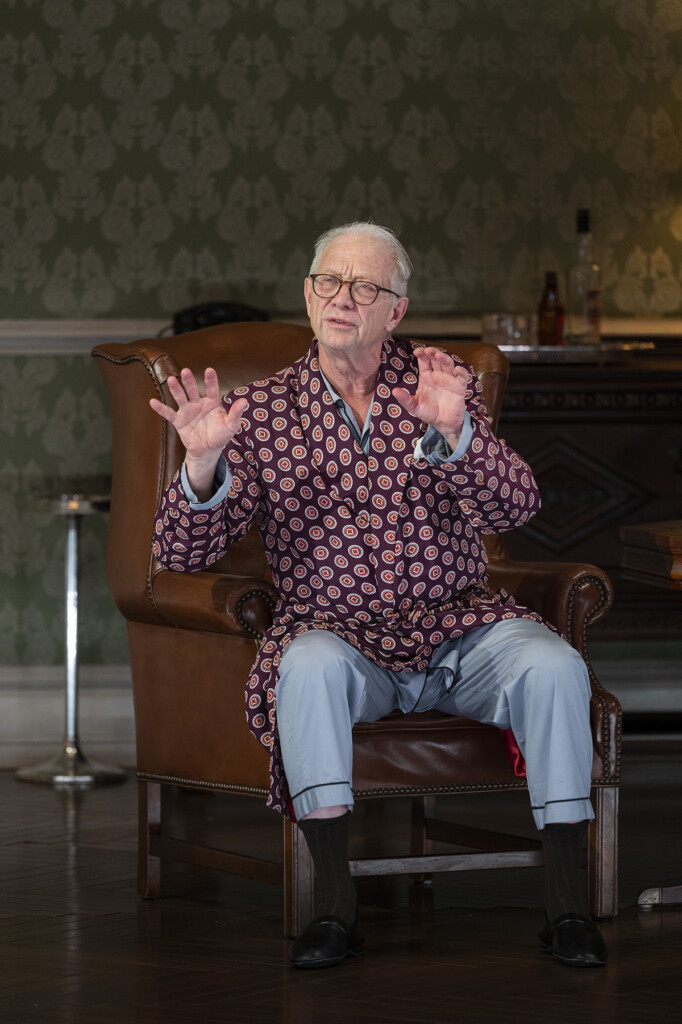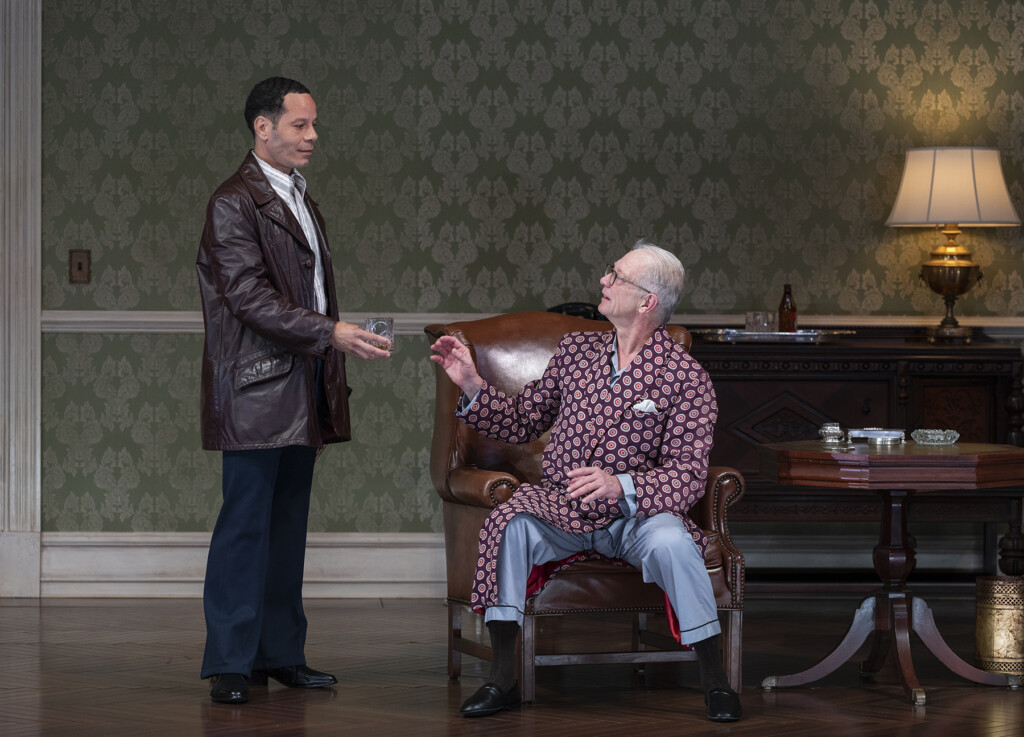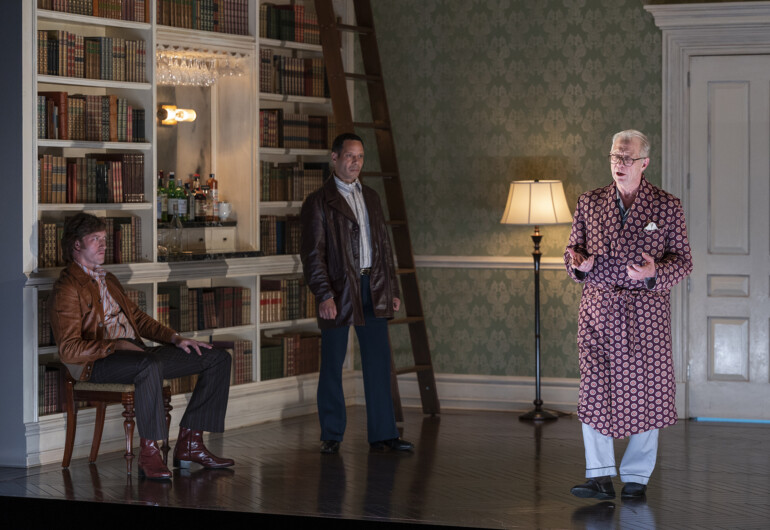At the age of 15, a “North Shore boy” by the name of Jeff Perry was propelled into the world of theatre at the encouragement of a high school drama teacher. Since then, his life-spanning career has been in support of theatrical endeavors on the local and national level, but few resonate as deeply as his work as a co-founder and ensemble member of Steppenwolf Theatre in Chicago. Now, in his latest role, Perry embodies the enigmatic Hirst in No Man’s Land — running now through August 20 at Steppenwolf.
In this production — originally penned by Harold Pinter in 1975 — the four main characters, including Hirst, walk the line where there are “no hard distinctions between the present and memory, between what’s true and what may not be true.” This piece is yet another captivating, poignant example of the nearly 50 years of stellar programming coming from the company.
“What my gang of theatre-loving folks have tried to do is to have a love of and a reverence for the story that we’re telling. To practice it a lot, then to try to make that practice and the footprints of that practice disappear, and make it feel like it’s being made up like jazz,” Perry said. “Our experiment in self-determination and ownership of an art that we loved as a group — that is approaching its 50th year — may be singular, and a bit miraculous, in American theatre history.”
Below, read our conversation with Perry as he talks us through his connection to source material, demystifies No Man’s Land and looks to the future of how we interact with art.

Better: Can you share a little about No Man’s Land from your perspective? How did the show make its way into this season?
Jeff Perry: At different times in different decades, Austin [Pendleton] and I kick around plays, we’ll submit them and they won’t fit in a season the right way. But this one finally landed.
My introduction to Harold Pinter’s writing came about largely because of John Malkovich. One of the things I saw my classmates at Illinois State University do in college was a production of Harold Pinter’s The Lover, where I saw Malkovich [alongside] original company member, Moira Harris. …
Then also in that time period, my heart had enough courage to try to direct Samuel Beckett’s Krapp’s Last Tape. And in future years I would have the feeling from reading some of both of their work that [Pinter and Beckett] were two people who were pretty concerned with the questions rather than the answers of how we live, how we get by in any given day.
I remember kind of an epiphany of: A lot of psychological drama seems like it’s predicated on wanting to capture the motivations, the reasons, the aspirations, maybe not a conclusion, but a shared understanding of how these people live and how they came to be. …
In my brain lately, I’m thinking a lot of times it seems like there’s a contract between us and the art, that by and large, we’re supposed to end up in a version of communal, shared reception and shared conclusion. You go to a piece of jazz or a string quartet, and I don’t have that same expectation, I don’t feel that same contract. Even though we’re in community, it’s meant to hit us — if it hits us — individually. That’s what Pinter intended, and that’s what we’re going to try to do.

What specifically drew you to the role of Hirst? How do you connect to it?
JP: I am as brain tired, nervous system tired and physically tired as I have ever been after trying to do this work. And I love that challenge, it’s exhilarating and it kicks my butt. There’s a density of possibility, and of sheer words, in Pinter’s writing, and a real formal structure that is very tricky but really fun to find in how he controls time and space.
He’s a control freak about how he scores and writes, it’s almost like a piece of music. All his punctuation, his ellipses, his slight pauses, his silences — they all do a different thing [and impact] how an audience receives what’s almost like the retelling of a dream, playing with memory and a belief that people are more unknowable than knowable.
It hits me like a dream because you can be flying and all of a sudden you can be your sister and then you’re yourself again. Pinter kind of does a version of that in his writing — and I love that.

One aspect that seemingly has always followed this production is the difficulty found in trying to explain it to prospective audiences — can you share any thoughts on that?
JP: I was reading a Vincent Canby review of a 1994 revival of No Man’s Land in which he said, “There’s one thing you should remember when you go to No Man’s Land: you don’t have to figure out what it means, or better yet, it means whatever you think at the time you see it.”
Now, that can be a daunting thing to say to an audience who goes, “I have no idea what this is, but should I lay down some money and check it out?”
But, here’s what I use as a reality base. Hirst is a homeowner, who’s a poet, who’s successful, who seems rich but who seems stuck. Let’s just call it the stuck of someone who knows they’re in the last chapter. He knows he’s going to live out his years, but has no idea how many more years that’ll be. He feels like he’s in a certain kind of purgatory — hence No Man’s Land.
It could be about his creative output, about how to live, about how his 20s and 30s are more vibrant now than they ever were — and they’re a source of both wonder and torture. Is that any way to live, just in your memory?
I think all of that is kind of simple, what Pinter’s writing about. What gets confusing is you have what feels like four unreliable narrators. You don’t know when they’re telling the truth. And that’s because Pinter also comes from a place of “I think people spend a lot of time trying not to reveal themselves.” The fear of revelation leads to, “I’m going to disorient you on purpose, so that maybe you become vulnerable.” That seems to be a lot of the operating principle of Pinter characters — I need to figure out this chapter of life and I don’t know how, but I’m trying.
In the wake of a pandemic that closed countless theatres and put the remaining performance halls “into existential survival mode,” Perry implores audiences to experience a live show now more than ever.
Learn more about Steppenwolf Theatre‘s upcoming productions and learn more about how to support Steppenwolf’s ongoing programming and education programs.
More from Better:
- Steppenwolf’s ‘1919’ Brings Poetry to the Stage in a Look Back at a Dark Period in Chicago History
- 31 Best Things to Do in Chicago and the Suburbs in August 2023
- Better Makers: Court Theatre Gala Raises $300K For Artistic and Educational Programming in Chicagoland

Margaret Smith is a Chicago-based writer and editor with a passion for socio-political storytelling about their community. They are a graduate of Columbia College Chicago.

